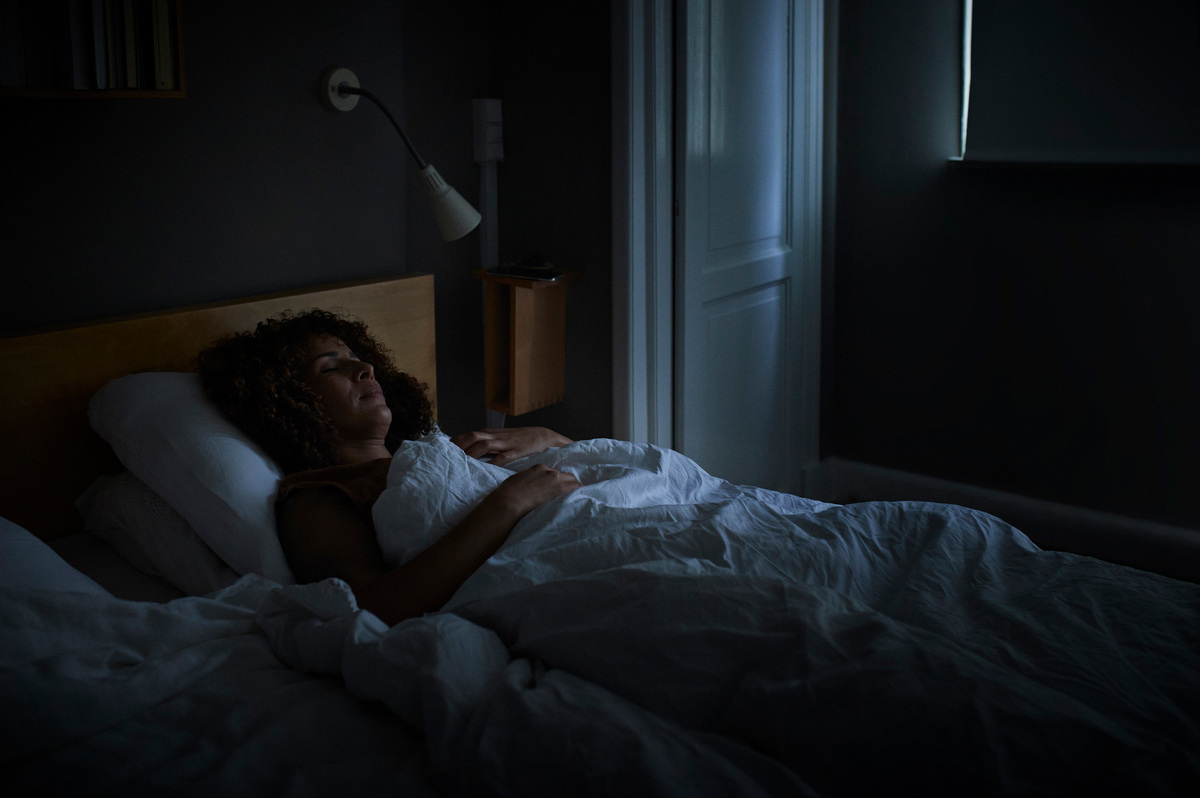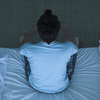
Klaus Vedfelt/Getty Pictures

Klaus Vedfelt/Getty Images
Turning off the lights and closing the curtains is not precisely a catchy, new slumber hygiene hack, but this frequent feeling advice is attaining even extra scientific credibility.
Several Us citizens slumber in a home that’s punctuated with some form of synthetic gentle — irrespective of whether it can be coming from a Tv, a jumble of electronics or an intrusive streetlight.
New investigation implies that 1 night time of sleep with just a average sum of mild may possibly have adverse outcomes on cardiovascular and metabolic overall health.
“I was astonished that even this quite, I would say, modest total of light just obtaining via the eyes to the brain continue to had this sort of notable impact,” states Dr. Phyllis Zee, senior writer of the new research and director of the Center for Circadian and Rest Medicine at Northwestern University.
The findings tie into a broader body of evidence that signifies getting uncovered to mild at night time may well be harmful in a range of techniques and could predispose people to persistent disorders.
Physiological consequences of mild
The compact, 20-man or woman analyze performed by Zee and her staff at Northwestern was developed to measure the physiological effects of 100 lux of synthetic mild on healthy older people even though they had been sleeping.
“This is about sufficient gentle that you could it’s possible see your way around, but it is really not sufficient light-weight to genuinely read through comfortably,” says Zee. For the examine, all the individuals used their first night sleeping in a mostly darkish home. The upcoming evening, fifty percent of them slept in a additional illuminated area (the mild was placed overhead).
In the meantime, the scientists ran exams on the sleepers: they recorded their brainwaves, measured their heart premiums and drew their blood each couple of hours, amongst other items. In the early morning, they’d give both groups a major dose of sugar to see how nicely their devices responded to the spike.

The results, released in the Proceedings of the Nationwide Academy of Sciences this month, exhibit several crystal clear dissimilarities involving the two teams.
As opposed to those people who spent equally nights in the dark, the group exposed to the light had elevated heart prices throughout the night time. They also experienced amplified insulin resistance in the early morning, indicating they experienced far more trouble acquiring their blood sugar into a ordinary assortment.
Light-weight can disrupt metabolic rate
Zee states there are numerous probable approaches that being uncovered to mild at evening could disturb our fat burning capacity.
A single probability — supported by investigation — is that acquiring the light-weight on disrupts the quality of snooze, but amazingly this study did not obtain that final result while monitoring the persons in the lighted place. In fact, the individuals generally documented that they thought they slept fantastic.
The researchers also measured levels of melatonin, a hormone that allows with the timing of circadian rhythms and promotes slumber. Melatonin is generally suppressed throughout the working day and rises at night time.
Experiments exhibit artificial light-weight at night can suppress melatonin amounts, and scientists have uncovered a hyperlink concerning the disruption of melatonin and numerous diseases, which include cancer and diabetic issues. Nevertheless in this article, way too, the analyze did not find proof that melatonin concentrations were being decreased among the the men and women sleeping with the gentle on.
“That likely signifies that the mild degree that was getting by the eyes was not really shiny adequate to suppress melatonin,” states Zee.
Having said that, Zee and her crew think that this modest amount of gentle was adequate to activate the sympathetic arm of the autonomic nervous procedure — what is actually liable for the body’s battle or flight reaction. This is intended to awesome down through slumber as the body moves into a parasympathetic point out, when the body’s heart amount and respiration lessen.
The improvements in cardiovascular function propose the smaller volume of gentle was plenty of to change the nervous system to a far more activated and alert point out.
“It’s pretty much like the brain and the heart understood that the lights ended up on, even though the unique was sleeping,” says Zee.
The examine is an significant example of how even fairly dim light-weight publicity can be disruptive to our slumber-wake cycle, suggests Dr. Chris Colwell, whose lab at UCLA research the mechanisms underlying circadian rhythms.

He states the conclusions makes feeling since the autonomic anxious technique has a strong daily rhythm.
“You will find a whole lot of coordinated actions that have to happen in buy for us to get a excellent night’s slumber and the autonomic anxious system harmony regulates that,” suggests Colwell.
This effect on the anxious procedure wasn’t “dramatic” — not as if the individuals were being awake — but Colwell suggests it is really nonetheless about: “You do not want that heading on when you might be attempting to get a superior night’s rest.”
Increased possibility of serious sickness
The study’s conclusions that metabolic overall health suffered usually are not solely stunning.
Colwell notes there is certainly previously a sound pool of analysis, as effectively as significant population reports, demonstrating that disrupting circadian rhythms tends to make it more difficult to control blood glucose ranges.
Some of these human scientific studies have utilized a a lot brighter intensity of gentle — and not while people had been truly sleeping. And whilst the findings of this analyze by itself can not predict what would transpire in the extensive term, Colwell suspects the dangerous effects would be cumulative: “This was only just one evening, so picture if you are dwelling that way consistently?”
The body’s “master clock,” called the suprachiasmatic nucleus, is uncovered in the brain, but organs and tissues all through the human body have their very own mobile timekeeping units. Cells in the pancreas that secrete insulin are 1 instance. Disrupting the snooze-wake cycle can have an affect on their ability to correctly secrete insulin, which in switch controls blood sugar.
“That’s likely to improve the hazard of long-term illnesses like insulin resistance, diabetic issues and other cardiometabolic troubles,” states Dr. Charles Czeisler, main of the Division of Sleep and Circadian Conditions at the Brigham and Women’s Hospital in Boston and a professor at Harvard Healthcare University.

For case in point, a significant observational study of extra than 40,000 ladies observed that sleeping with a Tv or mild on was involved with a 17{614fc3c32b079590f5b6a33afe99f1781dd92265c15f5c1e8aa861cac1d0c269} enhanced possibility of attaining 11 lbs about the training course of five several years.
Czeisler’s possess research has seemed at the metabolic consequences of disruptions in circadian rhythms for lengthier than just one particular night time.
In a recently revealed examine, he and his colleagues conclude that the unfavorable outcomes on fat burning capacity noticed in their study contributors about the study course of a few weeks had been mainly simply because of disruptions to circadian rhythms — not automatically due to the fact of rest deficiency.
“When we did not raise their publicity to synthetic mild at evening, we did not see adverse effects of long-term snooze deficiency on glucose metabolic rate,” he suggests.
This is not to say that snooze deficiency does not also have big adverse outcomes on wellness — it does — but he suggests it basically underscores the considerably-reaching effects of currently being exposed to light at nighttime.
“People think that as prolonged as they drop asleep and are unconscious, it can be not owning physiological effects, but which is just not genuine,” Czeisler says.
